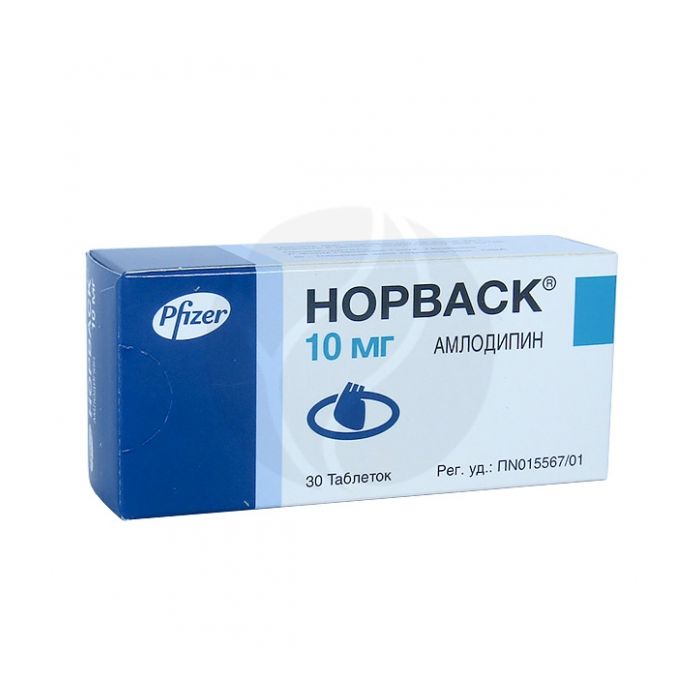Norvasc tablets 10mg, No. 30
Expiration Date: 11/2025
Russian Pharmacy name:
Норваск таблетки 10мг, №30
Arterial hypertension (first-line agent for monotherapy or in combination with other antihypertensive drugs), stable angina pectoris, vasospastic angina pectoris (Prinzmetal's angina pectoris, or variant angina pectoris), vasospasm / vasoconstriction, as well as patients refractory to treatment with nitrates or beta-blockers ( monotherapy or in combination with other antianginal drugs).
With arterial hypertension and angina pectoris, the initial dose is 5 mg once a day. An increase to a maximum dose of 10 mg is possible, depending on the patient's individual response. Any dose adjustment while using thiazide diuretics, beta-blockers, ACE inhibitors is not required.
Active ingredient: amlodipine besylate at a dose of 13.870 mg, equivalent to -10 mg of amlodipine, respectively.
Excipients: fine crystalline cellulose, anhydrous calcium hydrogen phosphate, sodium starch glycolate type A, magnesium stearate.
Hypersensitivity, arterial hypotension (less than 90 mm Hg), shock, acute myocardial infarction. Restrictions on use: severe aortic stenosis, heart failure, liver dysfunction, childhood (safety and efficacy have not been determined).
Pharmacological action
Antianginal, antihypertensive. Norvasc blocks the flow of calcium ions through the membranes into the smooth muscle cells of the myocardium and blood vessels (calcium channels). Expansion of blood vessels leads to a decrease in blood pressure. The antianginal effect is due to both a decrease in O2 consumption due to the expansion of arterioles and a decrease in OPSS (afterload), and an increase in O2 delivery due to dilatation of the main coronary arteries and arterioles in ischemic and unchanged areas of the myocardium.
Indications
Arterial hypertension (first-line agent for monotherapy or in combination with other antihypertensive drugs), stable angina pectoris, vasospastic angina pectoris (Prinzmetal's angina pectoris, or variant angina pectoris), vasospasm / vasoconstriction, as well as for patients refractory to treatment with nitrates or beta-blockers means of monotherapy or in combination with other antianginal agents).
Contraindications
Hypersensitivity, arterial hypotension (less than 90 mm Hg), shock, acute myocardial infarction. Restrictions on use: severe aortic stenosis, heart failure, liver dysfunction, childhood (safety and efficacy have not been determined).
Dosage and administration
In case of arterial hypertension and angina pectoris, the initial dose is 5 mg once a day. An increase to a maximum dose of 10 mg is possible, depending on the patient's individual response. Any dose adjustment while using thiazide diuretics, beta-blockers, ACE inhibitors is not required.
Side effects
Headache, swelling, fatigue, drowsiness, nausea, abdominal pain, hot flashes, palpitations and dizziness; less often - dyspepsia, arthralgia, asthenia, shortness of breath, gingival hyperplasia, gynecomastia, impotence, increased frequency of urination, mood changes, muscle cramps, myalgia, pruritus, rashes, visual disturbances; rarely - erythema multiforme, jaundice and increased levels of hepatic transaminases.
Overdose
Symptoms: excessive peripheral vasodilation, pronounced and prolonged decrease in blood pressure, tachycardia. Treatment: gastric lavage, the appointment of activated carbon, giving the patient a horizontal position with raised legs, monitoring the performance of the heart and lungs, monitoring the volume of circulating blood and urine output; symptomatic and supportive therapy, intravenous administration of fluids, calcium gluconate, dopamine, mezatone. Hemodialysis is not effective.

